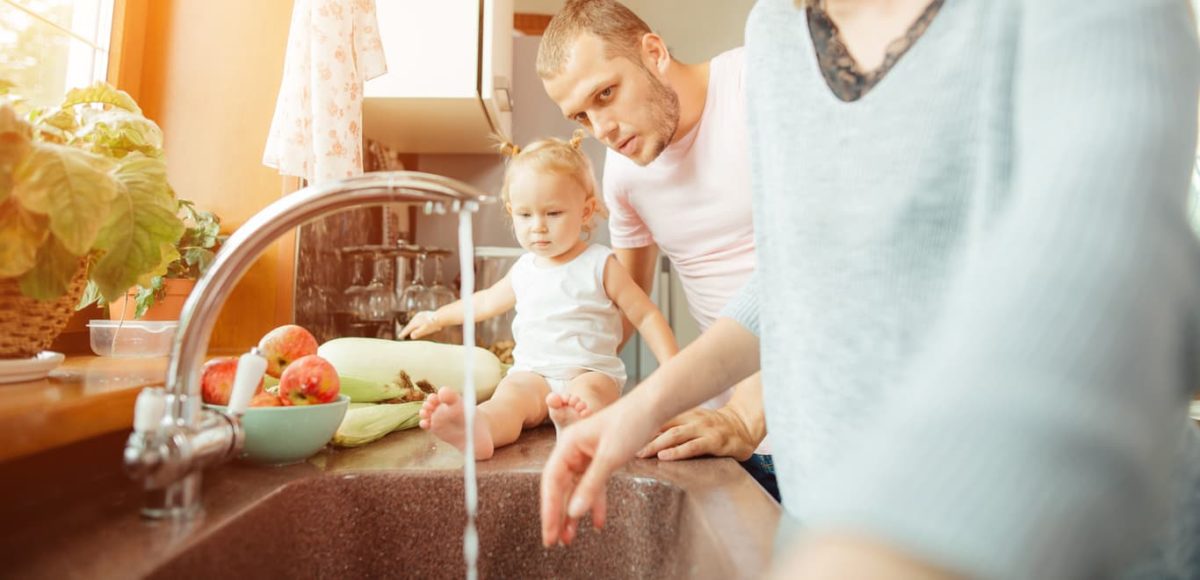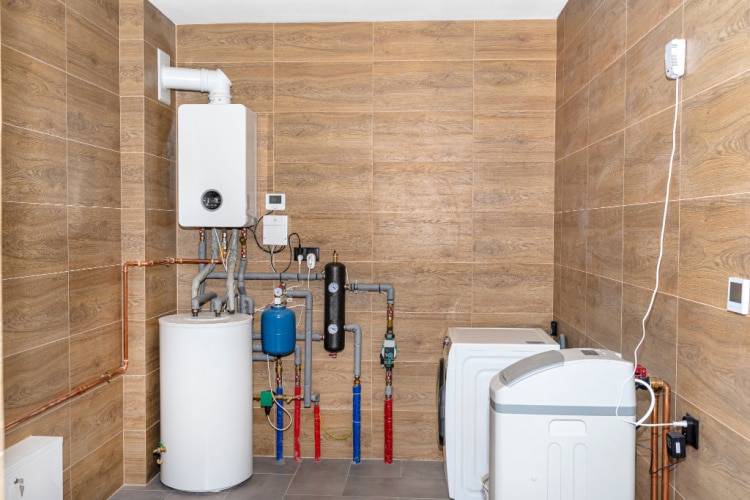To get soft water in an apartment, install a water softener system for improved water quality. Soft water reduces mineral buildup and leaves skin feeling smooth.
Living in an apartment doesn’t mean you have to settle for hard water. By taking a few simple steps, you can enjoy the benefits of soft water in your living space. Hard water can lead to limescale buildup in your appliances and on your skin and hair, so it’s essential to find a solution.
Installing a water softener system is a cost-effective way to improve the quality of your water, making it softer and gentler on your skin and hair. Read on to learn more about how to get soft water in your apartment and the benefits it can bring to your daily life.

Credit: blog.apartmentsearch.com
Finding The Right Water Softening System
Discovering the right water softening system for your apartment is crucial to achieving a continuous supply of soft water for your daily needs. With a variety of options available, it’s essential to consider space, installation, and maintenance requirements to find the best solution for your specific situation.
Assessing Your Water Hardness
Before you can choose the right water softening system for your apartment, it’s important to first assess the hardness of your water. This can be done using a simple water hardness testing kit available at most hardware or home improvement stores. The kit typically includes test strips that change color depending on the level of hardness in your water.
Once you have the test results, you can determine whether your water is slightly hard, moderately hard, or very hard. Knowing the level of hardness will guide you in selecting the appropriate water softening system that can effectively address your specific needs.
Considering Space Limitations
When it comes to getting a water softening system for your apartment, it’s crucial to take into account the space limitations you may have. Apartments often have limited space, so finding a compact water softener that can fit in a small area is essential.
There are various types of water softening systems available, including salt-based systems, salt-free systems, and magnetic or electronic water conditioners. Each type has its own footprint and space requirements, so it’s important to consider the dimensions and installation specifications before making your decision.
If space is a concern, you may opt for a compact salt-based water softener that can fit under the sink or in a utility closet. Alternatively, you could consider a salt-free system or magnetic/electronic water conditioner, which tend to be smaller in size and require less space for installation.
By taking into account the space limitations in your apartment, you can ensure that the water softening system you choose fits seamlessly into your living environment without sacrificing valuable space.
Credit: www.youtube.com
Portable Water Softening Options
When living in an apartment, getting soft water is crucial for various household tasks. Portable water softening options offer convenience and efficiency. Let’s explore how you can achieve soft water using these portable units.
Using Portable Water Softening Units
Portable water softening units can easily be connected to your faucet or showerhead for quick and effective softening of water. The compact size of these units makes them ideal for apartment living. By passing water through resin beads, these units remove minerals that cause hardness.
Benefits Of Portable Options
- Convenient installation and setup without the need for permanent fixtures
- Cost-effective solution for renters or temporary living situations
- Improves the quality of water for drinking, bathing, and cleaning tasks
With portable water softening options, you can enjoy the benefits of soft water in your apartment without the need for extensive plumbing changes or permanent installations.
Installing A Permanent Water Softening System
Types Of Permanent Systems
There are two main types of permanent water softening systems:
- Traditional salt-based systems
- Salt-free systems
Professional Installation Vs. Diy
Hiring a professional ensures proper installation and maintenance.
DIY installation can be cost-effective but may require more effort.
Maintenance And Upkeep
Ensuring the soft water supply in your apartment remains efficient and problem-free requires regular maintenance and proper upkeep. By performing routine maintenance tasks and promptly addressing common issues, you can enjoy the benefits of soft water and extend the lifespan of your water softening system.
Routine Maintenance Tasks
Regular maintenance tasks are essential to keep your water softening system running smoothly. Here are some routine maintenance tasks you can perform:
- Check the salt levels in your water softener regularly and ensure they are at an adequate level. Low salt levels can lead to decreased efficiency and may result in hard water.
- Inspect and clean the brine tank at least once a year. Remove any debris or sediment to prevent clogs and blockages that can affect the performance of your system.
- Inspect the resin bed of the water softener. If you notice any signs of damage or fouling, consider scheduling professional maintenance to prevent further issues.
- Regularly clean the exterior of your water softening system to keep it free from dust and grime. Avoid using abrasive cleaners or harsh chemicals that could damage the system.
Troubleshooting Common Issues
Despite regular maintenance, you may encounter common issues with your water softening system. Here are some troubleshooting measures you can take:
- Problem: Water softener not regenerating salt.
- Problem: Resin bed fouling or iron buildup.
- Problem: Excessive water usage.
- Problem: Water feels slimy or has an unusual taste.
Solution: Check the salt levels and refill if necessary. Ensure the brine tank is properly connected and free from blockages.
Solution: Consider using resin cleaner or an iron removal product specifically designed for water softeners. If the issue persists, consult a professional.
Solution: Check for leaks and repair or replace any faulty components. Adjust the regeneration cycle frequency if required.
Solution: Ensure the resin bed is working properly and not saturated. Clean or replace the resin bed if needed. Consider using resin cleaner or sanitizer products.
Benefits Of Soft Water
Soft water offers numerous benefits, making it a valuable addition to any apartment. From improving the lifespan of appliances to promoting healthier skin and hair, the advantages of soft water are truly compelling. Let’s delve into the specific benefits of soft water in more detail.
Improved Appliance Lifespan
Soft water helps extend the lifespan of appliances. The reduction of mineral buildup in water-using appliances such as washing machines, dishwashers, and water heaters reduces the strain on their components. By minimizing scale and corrosion, soft water can help appliances operate efficiently for longer periods.
Healthier Skin And Hair
Soft water leads to healthier skin and hair. It prevents the drying and irritation that hard water can cause. Because it rinses away more effectively than hard water, soft water can help reduce skin issues such as eczema and dryness. It also leaves hair feeling softer, silkier, and less prone to breakage.

Credit: waterdefense.org
Frequently Asked Questions Of How To Get Soft Water In An Apartment
Is There A Way To Get Soft Water In An Apartment?
Yes, there are ways to get soft water in an apartment. You can use water softening devices like portable water softeners or magnetic water conditioners. Another option is to install a water softener system that connects to your apartment’s plumbing.
How Do I Soften The Water In My Apartment Shower?
To soften water in your apartment shower, consider installing a water softener system to reduce mineral content.
How Do I Get Rid Of Hard Water In My Apartment?
To get rid of hard water in your apartment, use a water softener system or install a whole-house filtration system. Regularly clean faucets and fixtures with vinegar to reduce buildup. Consider using citric acid or specialized cleaning products for stubborn stains.
How Do You Turn Hard Water Into Soft Water?
To turn hard water into soft water, you can use a water softener. Water softeners remove minerals like calcium and magnesium that cause hardness. The process involves ion exchange, where the hard minerals are replaced with soft minerals like sodium.
This results in softer water for various uses.
Conclusion
Achieving soft water in your apartment can be a game-changer for your daily routines. By following the simple steps outlined in this blog post, you can enjoy the benefits of cleaner clothes, smoother skin, and a more efficient water heating system.
With the right knowledge and a few key products, you can say goodbye to hard water problems and hello to a new level of comfort and convenience in your apartment. Don’t let hard water hold you back – take action today and enjoy the difference soft water can make in your life.
